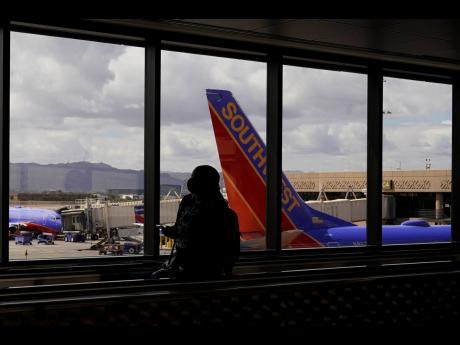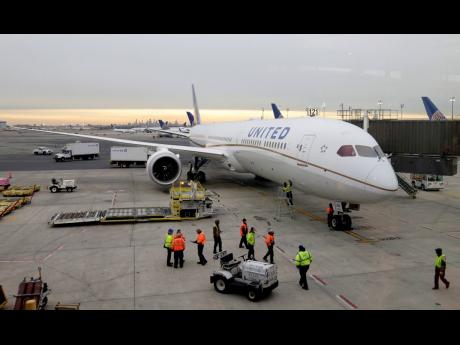Airlines fear 5G roll-out will upend travel this week
The airline industry is raising the stakes in a showdown with AT&T and Verizon over plans to launch new 5G wireless service this week, warning that thousands of flights could be grounded or delayed if the roll-out takes place near major airports.
CEOs of the nation’s largest airlines say that interference from the wireless service on a key instrument on planes is worse than they originally thought.
AT&T and Verizon plan to activate their new 5G wireless service today, Wednesday, after two previous delays from the original plan for an early December roll-out.
The new high-speed 5G service uses a segment of the radio spectrum that is close to that used by altimeters, which are devices that measure the height of aircraft above the ground.
The Federal Communications Commission, FCC, which runs the auctions of radio spectrum, determined that C-band could be used safely in the vicinity of air traffic. The FCC in 2020 set a buffer between the 5G band and the spectrum that planes use to resolve any safety concerns.
But Buttigieg and FAA Administrator Stephen Dickson, whose agency is responsible for aviation safety, saw a potential problem. On Friday, they asked AT&T and Verizon to hold off activating C-band 5G near an undetermined number of “priority airports” while the Federal Aviation Administration conducted further study.The telecoms dismissed the concerns.
The wireless industry trade group CTIA notes that about 40 countries have deployed the C-band strand of 5G without reports of harmful interference with aviation equipment.
But AT&T CEO John Stankey and Verizon CEO Hans Vestberg did offer to reduce the power of their 5G networks near airports, as France has done.
“The laws of physics are the same in the United States and France,” Stankey and Vestberg said in a letter on Sunday to Buttigieg and Dickson. “If US airlines are permitted to operate flights every day in France, then the same operating conditions should allow them to do so in the United States.”
Although they took steps to soothe the federal officials, the telecoms are still bickering with airlines, which have cancelled more than 10,000 US flights since Christmas Eve because of bad weather and labour shortages caused by COVID-19.
“While the airline industry faces many challenges, 5G is not one of them,” Vestberg said in a company memo on Tuesday.
Under the agreement, the FAA will conduct a survey to find out the number of planes affected. The FAA will allow planes with accurate, reliable altimeters to operate around high-power 5G. But planes with older altimeters will not be allowed to make landings under low-visibility conditions.
The two-week postponement will give the FAA and the companies time to implement the agreement.
AT&T and Verizon will be allowed to launch C-band service this month under already-granted FCC licences. The airlines have until Friday to give the companies a list of up to 50 airports where they believe the power of C-band service should be reduced through to July 5.
SOLE POWER
Until July, the telecoms will talk to the FAA and airlines about potential long-term measures regarding 5G service near airports. However, under terms of the agreement with the FAA, AT&T and Verizon will have sole power to decide if any changes in service will be made.
“We felt that it was the right thing to do for the flying public, which includes our customers and all of us, to give the FAA a little time to work out its issues with the aviation community and therefore avoid further inconveniencing passengers with additional flight delays,” Vestberg said in his memo.
Nicholas Calio, president of the airline trade group, was more muted in his comments about the agreement, although he thanked federal officials for reaching the deal with AT&T and Verizon.
“Safety is, and always will be, the top priority of US airlines. We will continue to work with all stakeholders to help ensure that new 5G service can coexist with aviation safely,” Calio said.
The FAA issued a brief statement about the two-week delay, saying it looks forward “to using the additional time and space to reduce flight disruptions associated with this 5G deployment”.
AT&T and Verizon say their equipment will not interfere with aircraft electronics, and that the technology is being safely used in many other countries. Critics of the airline industry say the carriers had several years to upgrade altimeters that might be subject to interference from 5G.
The CEOs of 10 passenger and cargo airlines, including American, Delta, United and Southwest, said 5G will be more disruptive than they originally thought, because dozens of large airports that were to have buffer zones to prevent 5G interference with aircraft will still be subject to flight restrictions announced last week by the FAA, and because those restrictions won’t be limited to times when visibility is poor.
“Unless our major hubs are cleared to fly, the vast majority of the travelling and shipping public will essentially be grounded. This means that on a day like yesterday, more than 1,100 flights and 100,000 passengers would be subjected to cancellations, diversions or delays,” the CEOs said.
AP


